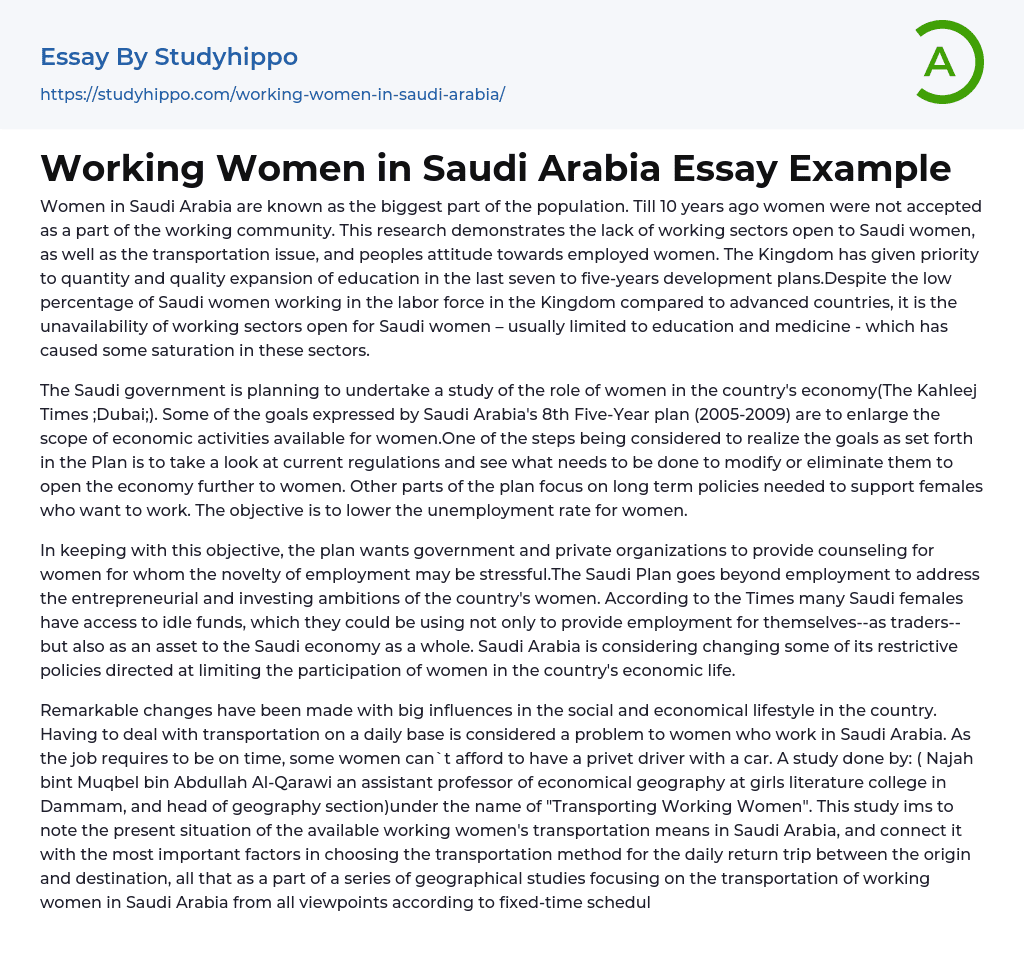Women in Saudi Arabia were not considered part of the workforce before 10 years ago, despite making up the majority of the population. However, job opportunities for women are limited due to transportation issues and societal attitudes towards employed women. While development plans over the past five to seven years have prioritized improving education quality and quantity, there is still a low percentage of women compared to developed countries in the labor force. Additionally, saturation in job sectors such as education and medicine has contributed to restricted employment opportunities for women.
The Kahleej Times of Dubai reports that the Saudi Arabian government plans to investigate how females affect the nation's economy. The 8th Five-Year plan (2005-2009) underscores Saudi Arabia's objective to broaden economic prospects for women. Officials are searching for means to modify or eliminate current regulations, focusing on endur
...ing policies that encourage female job opportunities, with the ultimate aim of reducing female unemployment rates.
The Saudi Plan aims to provide counseling for women who may find employment stressful. Additionally, it addresses the entrepreneurial and investing aspirations of Saudi women. Many females in the country have access to idle funds that could be utilized for self-employment as traders, ultimately benefiting the Saudi economy. The plan includes potential policy changes to increase the participation of women in the country's economic life.
Notable social and economic changes have been implemented in Saudi Arabia, affecting the daily transportation struggles of working women. Due to the need to arrive on time, many women cannot afford private drivers or cars. Assistant Professor of Economic Geography at Girls Literature College in Dammam and Head of Geography Section, Najah Bint Muqbel Bin Abdullah Al-Qarawi conducted
a study titled "Transporting Working Women" in efforts to assess the available transportation options for working women and determine the most influential factors in selecting means of transportation. This study is part of a series of geographical studies focused on enhancing the transportation system for working women in Saudi Arabia. "We need to have a public transportation system," remarked Sara Baghdadi, the first woman to serve as executive director for public relations of the Jeddah Chamber of Commerce and Industry.
According to the speaker, she prefers to utilize London's public transportation system and does not drive. Additionally, the government supports women working, while societal pressure prevents men from sharing household responsibilities with their employed spouses. She believes that the difficulties faced by women are more social in nature than political.
In my opinion, women who work in the private or government sectors should receive additional transportation allowance or access to a reliable transportation system to address transportation issues. In Saudi Arabia, where only five percent of women are employed, a documentary filmmaker named Bregtje van der Haak was granted permission to explore the lives of working women. Her personal road movie examines how these women search for new opportunities while balancing Islamic principles and advanced technology. With the Ministry of Information as her guide, she interviews a gynecologist, an IVF specialist, a journalist, a photographer, the first female airline pilot, a university professor, and a newsreader for Saudi state television to gain insight into what it means to be a modern woman in a devoutly religious country.
The film seeks to find the forces of change and highlights Prince Alwaleed Bin Talal, the fifth richest man
globally, who encourages the acceptance of women in Saudi workplaces by using his personal capital. He employs unveiled women dressed in the latest fashion at his Kingdom Holding and private palace; nonetheless, the filmmaker encounters only Saudi men in his luxury desert camp. While shedding light on the challenges of filming in a society in transition that is largely invisible to the West, the documentary offers a remarkable glimpse into the lives of working Saudi women. Conversely, many refuse to accept working Saudi women, and their society mistrusts their productivity. In conclusion, working women are a global issue, but particularly crucial in Saudi Arabia. The government is trying to provide opportunities for women to work in various sectors; however, transportation remains a significant obstacle for working Saudi women.
The ongoing and constantly changing debate surrounding the definition of successful women in society involves various perspectives. It is unlikely to be resolved anytime soon, with Al-Qarawi Najah bint Muqbel bin Abdullah from Saud University being one of the sources cited in this discussion.
Visit edu.sa/printpress/research.asp?rid=1093&id=1 to read the article "Opportunities Open up for Saudi Women" from www.7days.
Within the HTML tag, there is a hyperlink leading to the "Saudi Solutions" website at www.mazalien.com/saudi-solutions.html. This site discusses opportunities for women in Saudi Arabia.
- American Dream essays
- Barriers To Entry essays
- Capitalism essays
- Central Bank essays
- Compensation essays
- Consumerism essays
- Economic Development essays
- Economic Growth essays
- Economic Inequality essays
- Economic System essays
- Economy essays
- Employment essays
- Export essays
- Finance essays
- Free Trade essays
- Gross Domestic Product essays
- Human Development essays
- Income Inequality essays
- Industry essays
- Inflation essays
- International Business essays
- International Trade essays
- Macroeconomics essays
- Materialism essays
- Max Weber essays
- Microeconomics essays
- Minimum Wage essays
- Monetary Policy essays
- Monopoly essays
- Pricing essays
- Profit essays
- Recession essays
- resources essays
- Taxation essays
- Trade essays
- Unemployment essays
- Warehouse essays
- World economy essays
- Egypt essays
- Iran essays
- Iraq essays
- Israel essays
- Saudi Arabia essays
- Syria essays




